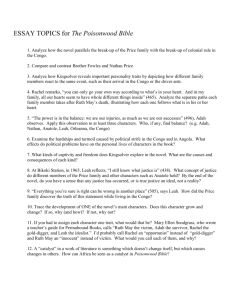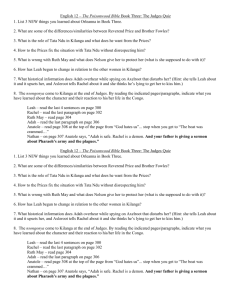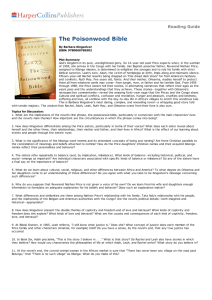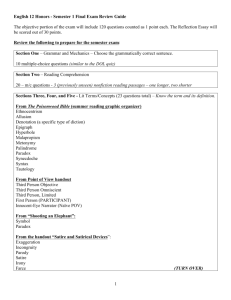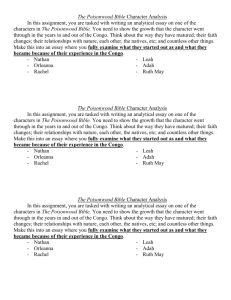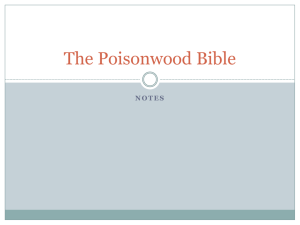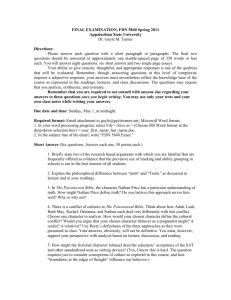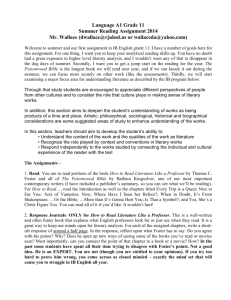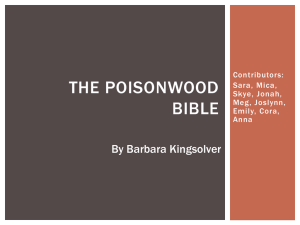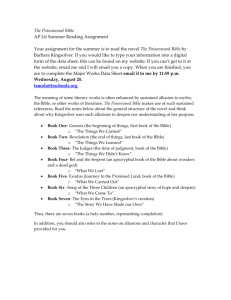Poisonwood Bible: Journal Assignment 1
advertisement
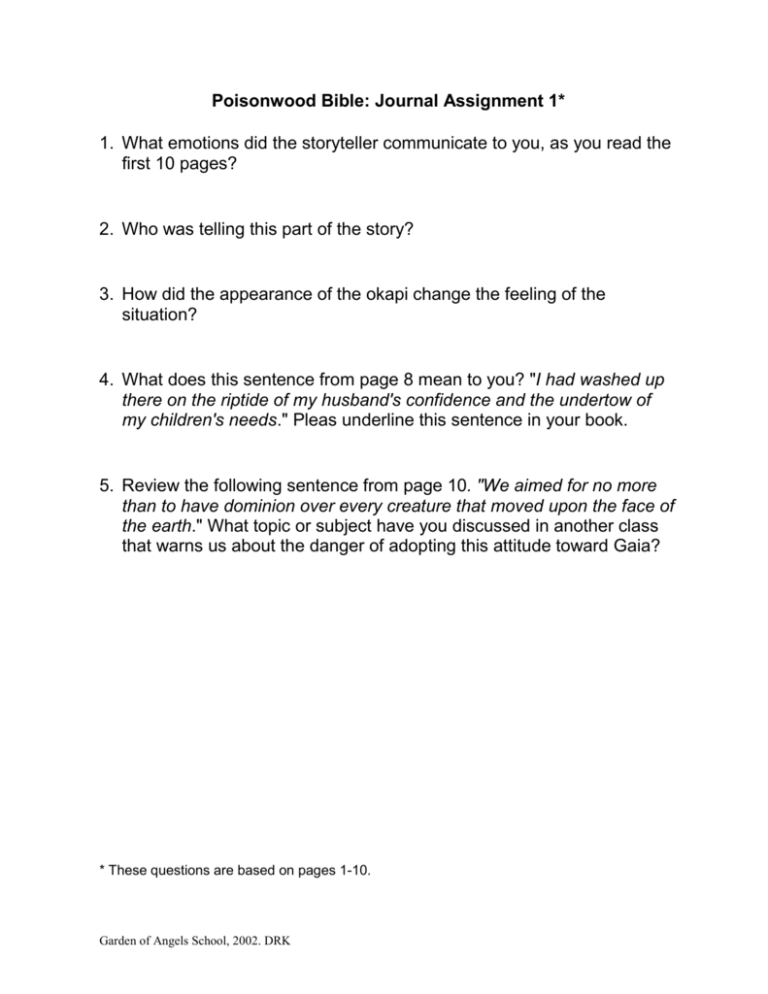
Poisonwood Bible: Journal Assignment 1* 1. What emotions did the storyteller communicate to you, as you read the first 10 pages? 2. Who was telling this part of the story? 3. How did the appearance of the okapi change the feeling of the situation? 4. What does this sentence from page 8 mean to you? "I had washed up there on the riptide of my husband's confidence and the undertow of my children's needs." Pleas underline this sentence in your book. 5. Review the following sentence from page 10. "We aimed for no more than to have dominion over every creature that moved upon the face of the earth." What topic or subject have you discussed in another class that warns us about the danger of adopting this attitude toward Gaia? * These questions are based on pages 1-10. Garden of Angels School, 2002. DRK The Poisonwood Bible: Journal Entry 2* 1. What was your reaction when you read the word “drownded” (pg. 20)? How did the misuse of the word drowned affect your impression of Ruth May? 2. At the top of page 21, Ruth May runs very different ideas together as if they were connected. What do you think is the most likely reason for this? A. She is too young to know better B. She is not really talking to us, we are reading her thoughts C. There is a hidden meaning for the connection of her different ideas 3. What do you think Rachel meant when she sad, “I was in the sloop of despond”? (pg. 23) 4. When Rachel first entered the town of Kilanga, she found its culture to be absolutely foreign and completely unsettling. What do you think the author is trying to get the reader to empathize with by having the Rachel character think things like; 1) do you use dial, don’t you wish everyone did?, and 2) use Listerine and get 45% fewer colds? 5. On page 26, what does Rachel’s comment tell us about her father’s intentions, “It was not so much a speech as a rising storm”? 6. What was the immediate reaction of the natives of Kilanga to father Price’s first speech? (pg. 28) 7. How old is Ruth May, and how old is Rachel? * These questions are related to pages 11 - 29 Garden of Angels School, 2002. DRK The Poisonwood Bible: Journal Entry 3* 1. Adah and Leah are twins. Which twin has hemiplegia? 2. What is the name of the airplane pilot who is their only contact with the world they left behind? 3. On page 34, Adah says, “Silence has many advantages.” What does she mean by this? 4. Father Price brought seeds from home to plant a demonstration garden. As father laid out his garden, Mama Tabata tried to get him to plant the seeds in hills rather than in a level field. What did father Price say to dismiss Mama Tabata’s coaching regarding the garden? 5. How did Mama Tabata come into the Price family’s life, and what is her function? 6. What happened to father Price after he ignored Mama Tabata’s warning, “That one, brother, he bite. … [sic] … Poisionwood” 7. On page 41, what does the term, paroxysm of exasperation refer to? 8. At the bottom of page 45, Rachel says, “I didn’t see there was any need for them to be so African about it.” How does this statement reveal Rachel’s ethnocentrism? 9. Who is Orleanna Price, and what did she do at Easter time that helped win over the crowd at the picnic? * These questions are related to pages 30 – 49. Garden of Angels School, 2002. DRK The Poisonwood Bible: Journal Entry 4* 1. Who is Tata Undo? (pg. 51) 2. How did the Price’s neighbor, Mama Mwanza, lose her legs and how many children does she have to care for? (pg. 52) 3. Leah scored very high on reading comprehension tests when the family was back in Georgia. (p.56) How did this change mother’s behavior toward the twins, and what did father Price warn Orleanna and the twins about? 4. What is a palindrome? In what way is the phrase, “Poor Dan is in a droop” a palindrome? 5. On page 57, what do the following sentences demonstrate about Adah’s reading habits? 1) “It from things new learn can you and front to back book different a is it?” 2) “Ti morf signiht wen nrael nac uoy dna tnorf ot kcab tnereffid a si ti.” 6. To what famous poem is Adah referring when she compares the language spoken by Methuselah, the gray parrot, to “Mr. Poe’s Raven”? (pg.58-59) 7. How did the first rainy day of the rainy season impact the garden and father Price? (pg. 63) 8. What is fried plantain? 9. Using the information on pages 60 – 62, work with one other person to draw a detailed picture of the Price family living space. Include all of the rooms and structures, as well as the forest and road at the edge of the Price family compound. 10. What was the result of father Price’s attempt to show the benefits of dynamite, by using it to help catch fish? (pg. 69-70) * These questions are related to pages 50 – 76. Garden of Angels School, 2002. DRK The Poisonwood Bible: Journal Entry 5* 1. When the Underdowns visited they brought a New York newspaper. The picture of Nikita Krushchev dancing with a native carried the caption, “Bingo Bango Bongo, I don’t want to leave the Congo.” What was the headline on the newspaper page that was folded back? (pg. 161) 2. What news about Congo politics seemed to shock mother and father Price? (pg. 162) 3. What was happening in Leopoldville and Stanleyville? 4. Who is Lumumba? 5. Explain the meaning of, “Your King Baudouin is living off the fat of this land, and leaving it up to the penniless mission doctors and selfless men like my husband to take care of their every simple need. Is that how a father rules?” 6. What was mother Price concerned about when she said, “Not a soul among these people has even gone to college or traveled abroad to study government. … [Sic] … And now you’re saying they’ll be left overnight to run every single school, every service, every government office? And the army? What about the army?” (pg.167) 7. What was the primary purpose of the Underdowns visit? (pg. 168) 8. When Rachel began to realize that her father was not going to allow the family to leave the Congo, what was her secret wish? 9. Adah informs us of some very important matters of religious observance that are part of the native non-Christian African religion. What are they? (pg. 172) * These questions are related to pages 159 – 175. Garden of Angels School, 2002. DRK The Poisonwood Bible: Journal Entry 6* 1. At the beginning of page 191 and again in the last paragraph on page 201, Orleanna Price directs her thoughts at the “little beast”. The little beast to whom she refers is probably: A) her conscience, OR B) a four legged wild animal in found only in rainforests 2. Orleanna says that Nathan Price simply could not understand why he should have a daughter except to own her like a plot of land. What does this statement reveal about Nathan’s view on equality between males and females? 3. Where did Orleanna first meet Nathan Price? (pg. 193-194) 4. In your opinion, what was the primary reason Orleanna decided to marry Nathan? (pg 194-195) 5. Nathan had a terrible experience as a soldier during World War II. He was wounded at the very beginning of a battle and because he was separated from his military company, he wound up as the only person who did not die in the battle. When he came home from the war he had a suspicion about himself from which he would never recover. What was that suspicion? (pg. 198) 6. Orleanna describes the personality of Nathan as being a tyrant before men and a child before his god. What type of “tough boy” does she say Nathan is like? (pg. 198) 7. What word or phrase would you use to describe the emotions Orleanna must have felt during the six years she describes at the top of page 200? 8. On page 201, Orleanna compares herself to Methuselah, cowering beside its cage. As a review of your earlier readings, who was Methuselah? (if you need help look back at page 81) * These questions are related to pages 191 – 201. Garden of Angels School, 2002. DRK The Poisonwood Bible: Journal Entry 7* 1. On page 209, Nelson explains some important ideas that are communicated in the way the Congolese structure their language. A. Living people, dead people, children who are not yet born and gods are all referred to by the term ____________ in the Congolese language. B. Animals, stones, bottles and all other things that are not “muntu” are called ___________. C. The stem word “ntu” is common to both of the terms in A) and B) above. What does the term “ntu” mean? 2. Nelson goes on to explain that the principles of “ntu” are asleep until they are touched by “nommo”. Nommo is the force that makes things live as what they are – man, tree, animal, etc. A. What does “nommo” mean? B. What are five different forms of nommo listed on page 210? 3. Adah likes Nelson’s explanation that the term used to name something, gives it the life that it has. She like is because it helps her explain something that has been a mystery for her. What is the mystery? (pg. 209) 4. According to the website http://www.babycenter.com/babyname/meanings.jhtml Adah means “beautiful addition”; and Leah means “weary” How well do these names match the twin’s individual personalities? (be sure to explain your answer. 5. What is the meaning of your name? In what way does it seem to match the life you have? (If you do not know the meaning of your name, try looking it up at the website listed above.) 6. The Price family has a reputation among the natives of being well intentioned and inane. What does the word “inane” mean? * These questions are related to pages 210 – 214. Garden of Angels School, 2002. DRK The Poisonwood Bible: Journal Entry 8* 1. After the Independence of the Congo cut off all the Price family’s monetary sitpends, both mother and Ruth may became very sick. The remaining girls were left in charge of all the chores necessary to keep the family from dying. Match the chore on the right with the name of the girl who was responsible for that chore: ______ Adah A) gathering fruit and nuts ______ Leah B) tending to the chickens ______ Rachel C) baking bread 2. Who continued to haul water and chop wood for boiling the water and for cooking? (pg. 220-221) 3. What is the meaning of these two sentences? “Our childhood had passes over into history overnight. The transition was unnoticed by anyone but ourselves.” (pg.218) 4. What do the following expressions mean? A. “… a tomboy who approaches housework like a cat taking a bath.” (pg 218) B. “ After his (father’s) displeasure reached a certain point, the three of us rubbed our bruises.” (pg 219) C. “The point of our exercise (writing down all of the resources for food) was to convince ourselves that the wolf was not exactly at the back door, but perhaps merely salivating at the edge of the yard.” (pg. 220) D. “Back when she was a happier woman … [sic] .. Our mother used to have mystery under her skin and we paid not the slightest attention. (pg. 220) * These questions are related to pages 218 – 222. Garden of Angels School, 2002. DRK The Poisonwood Bible: Journal Entry 9* 1. Leah reveals each of the three developments below, as we read pages 223-236. Copy at least one sentence from the book that illustrates each development listed below. Include the page number on which you found the sentences you copied: A. Leah begins feeling love toward Anatole. B. Anatole tells Leah about the start of civil war. C. Leah envy’s the Gaian rhythm and harmony in Mama Mwanza’s family. 2. At the top of page 230, Leah asks Anatole, “Why can’t they just make their deals with Lumumba? He’s the one that got elected.” Anatole replies, “They know. But Lumumba is not eager to give away the store. His loyalty is with his countrymen. He believes in a unified Congo for the Congolese, and he knows that every Katanga diamond from the south can pay a teacher’s salary in Leopoldville, or feed a village of Warega children in the north.” Who are the “they” to which both Leah and Anatole are referring? * These questions are related to pages 223 – 236. Garden of Angels School, 2002. DRK The Poisonwood Bible: Journal Entry 10* As Oleanna begins to recover from her depression and Ruth May begins to recover from her illness, Brother Fowles, his native wife and their children, return to Kilanga for a visit. Brother Fowles and Father Price wind up getting into an argument over their different interpretations of religion and the bible. Father Price takes the view that the natives are not religious, that in the eyes of his God they are savages who will go to hell if they don’t change their way of worshiping God. Describe a couple of differences in the way Brother Fowles views the religion and spirit of the natives. * These questions are related to pages 245 – 258. Garden of Angels School, 2002. DRK The Poisonwood Bible: Journal Entry 11* 1. Rachel reveals that both she and mother price tried to get Eben Axelroot to fly them out of the Congo. What did Orleanna promise to give Axelroot if he would take them out of there? (pg. 268-270) 2. Which daughter develops into a teacher, linguist, and archer? (pg. 277-278) 3. Anatole lists three reasons why the native boys dislike having a white female as their teacher. What are the three reasons? (pg. 279-281) 4. During a discussion about how the Congolese believe in making decisions by consensus and sharing wealth, Leah asks Anatole what “Beene” means. “Beene” is the nickname that Anatole gave to Leah. What does this name mean? (pg. 284-287) 5. In the pages 288–294, Rachel reveals three developments. Copy at least one sentence from the book that illustrates each development listed below. Include the page number on which you found the sentences you copied: A. Rachel and Axelroot grow closer together. B. Rachel finally starts to see some of the Gaian beauty and harmony within the rainforest and its natives. C. Axelroot reveals that the American CIA is plotting to assassinate President Lumumba. 6. On page 298, Adah stares at a palindrome she has written in her notebook: “Redrum sekil oh weki ekil ew.” A. Explain the meaning of this palindrome B. Who is Ike? * These questions are related to pages 268 – 298. Garden of Angels School, 2002. DRK The Poisonwood Bible: Journal Entry 12* 1. On the night when the ants attack Kilanga, what object did Rachel choose to take with her as she ran for the river? What happened to the object when she finally made it to the river? (pg. 301-302) 2. When mother Price had to decide whether to help Ruth May or Adah survive the ant attack, who did she choose? What did Adah do that was very unusual for her, while Orleanna was deciding? (pg. 305-306) 3. What specific event is Adah referring to when she says, “That night marks my life’s dark center, the moment when growing up ended and the long downward slope toward death began.”? (pg. 306) 4. As Leah and Anatole are crossing the river to escape the ants, Leah says, “I want to be righteous, Anatole. To know right from wrong. I want to live the right way and be redeemed.” Anatole responds by warning her not to make life like a mathematics problem. What is the rest of his warning? (pg. 309) * These questions are related to pages 300-311. Garden of Angels School, 2002. DRK The Poisonwood Bible: Journal Entry 13* Number each of the following developments in the order that they happened. ______ The village sides with Anatole and votes to allow Leah to hunt with the men. ______ Tata Ndu tells Nathan Price that he has failed as a missionary because he does not know how to sit and listen. ______ Tata Ndu explains that trouble will come from voting, because it does not build agreement among all people. ______ The outcome of a vote on whether to accept Jesus Christ as the personal savior of Kilanga was 11 for and 56 against. ______ Someone tries to kill Anatole by putting a green mamba snake next to his bed. ______ Leah openly disobeys father Price by telling him she will hunt with the men of the village. * These questions are related to pages 327-342. Garden of Angels School, 2002. DRK The Poisonwood Bible: Journal Entry 14* 1. Name two things that happened after the hunt that caused what should have been a celebration to turn into a melee of screaming and fighting. (pg. 353-354) 2. What does the word “melee” mean? 3. Just after father Price announced that he was giving up on Leah, that he “had washed his hands of her moral education”, Nelson came running into the house afraid for his life. Why was Nelson scared? What had been happening to other people in the village that gave Nelson added reason to be afraid? ( pg. 356) 4. After Nathan Price refused to let Nelson sleep in the house with the family, how did the girls try to help Nelson? (pg. 359) 5. Who had brought the mamba snake into the Price family’s chicken house? (pg. 362) 6. What was father Price’s initial reaction to the death of Ruth May? (pg. 369) 7. At Ruth May’s wake, why do you think Nathan went around baptizing the native children as the thunderstorm poured rain down? (pg. 374-375) * These questions are related to pages 353-375. Garden of Angels School, 2002. DRK The Poisonwood Bible: Journal Entry 15* At the beginning of Book Five of the Poisonwood Bible, Orleanna remembers how and why she finally left her husband. 1. Describe the context in which the following line appears, and identify to what significant Price family event it refers: (pg. 383) “When there was nothing left to move but myself, I walked to the end of the village and kept going…” 2. Explain the meaning of the following passage: (pg. 384) “But his kind will always lose in the end. [sic] Whether it’s a wife or a nation they occupy, their mistake is the same; they stand still ... Chains rattle, rivers roll, animals startle and bolt, forests inspire and expand, babies stretch open-mouthed from the womb, new seedlings creep forward into the light. Even a language won’t stand still. But they stake everything on that moment … . They’re desperate to hang on. But they can’t. … It all moves on.” 3. At the end of page 385, Orleanna tells us, “To live is to be marked. To live is to change, to acquire the words of a story, and that is the only celebration we mortals really know.” A. In the space below, make a list of at least 5 significant events in your life. Try to write down things that have happened at different times in your life. B. Now re-read the 5 significant events on your list. Then circle one of the following words that seems to best describe the kind of story that could be most easily written using the events on your list. Be sure to explain why you chose this word. + Comedy + Action adventure + Tragedy + Classic + Drama + Cult + Other (fill in another word your thinks fits even better) ____________ * These questions are related to pages 381-385. Garden of Angels School, 2002. DRK The Poisonwood Bible: Journal Entry 16* 1. What does the word “exodus” mean? 2. Leah comments that as the women trudged through rain and mud on their way to Bulungu, they were surprisingly lighthearted. To what does she attribute this lightheartedness? (pg. 390) 3. Father Price’s missionary work had at least one success in winning over the natives. What was it? (pg. 390) 4. In what way was Ruth May’s death liberating for the Price women? 5. On page 393, Leah says, “Father wouldn’t leave his post to come after us, that much was certain. He wasn’t capable of any action that might be seen as cowardice. …” At what point in Nathan’s life did he develop his fear of being seen as a coward? 6. Leah came down with what serious disease, as a consequence of thousands of mosquito bites, exhaustion and exposure to torrential downpours of rain? (pg.394) 7. At Bulungu, the Price women split up. (pg. 396-399) A. What does Rachel do to get completely out of the Congo? B. How do Orleanna and Adah leave the village? C. What does Leah decide to do? 8. After she is safe in Johannesburg, Rachel has to put up with Axelroot gawking at other women, and leaving her alone while he goes on his trips. Why does she put up with him? (pg. 403) * These questions are related to pages 390-406. Garden of Angels School, 2002. DRK
